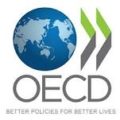Gender Analyst – Temporary
JOB DETAIL
The OECD is a global economic forum working with 38 member countries and more than 100 emerging and developing economies to make better policies for better lives. Our mission is to promote policies that will improve the economic and social well-being of people around the world. The Organisation provides a unique forum in which governments work together to share experiences on what drives economic, social, and environmental change, seeking solutions to common problems.
The OECD Development Centre (DEV) helps developing countries and emerging economies find innovative policy solutions to promote sustainable growth, reduce poverty and inequalities, address gender equality and improve people’s lives. The Centre facilitates policy dialogue between governments, involving public, private, and philanthropic actors. Countries from Africa, Asia and Latin America participate as full members in the Centre, where they interact on an equal footing with OECD members.
DEV is looking for an enthusiastic and motivated Gender Analyst to join the Country Diagnostics and Strategy (CDS) Team. They will contribute to the project “Just Transition in the Western Balkans: Supporting coordinated energy sector, social protection and fiscal reform”. The project covers the six economies in the Western Balkans (Albania, Bosnia and Herzegovina, Kosovo*, Montenegro, North Macedonia, and Serbia). The Analyst will support the team by focusing on social dimensions of the project and specifically the project’s cross-cutting gender component. The selected candidate will work under the supervision of the Head of Unit and other senior colleagues, and in close cooperation with the rest of the team.
The Just Transition in the Western Balkans project aims to enable energy sector reform in the Western Balkans by building the evidence base on subsidies and support measures to energy in the region and by encouraging the formulation of reform paths that account for the social impacts of reform and include necessary compensatory measures to ensure that the green energy transition does not harm the most vulnerable. The analyst will oversee delivering the cross-cutting gender component of the project: applying a gender lens to the modelling exercises and carrying out research and fact-finding to establish key dimensions of energy reform with differential effects for men, women, boys, and girls.
Main Responsibilities
Research and analysis
· Draft high-quality technical research documents, project reports and policy briefs/articles targeted at non-technical audiences and the media, under tight deadlines on (1) gender and energy poverty, (2) welfare at the household level and social support systems, including a gendered perspective, focusing on energy subsidies, and (3) employment linked to the energy sector, green jobs, and green skills.
· Review and build on gender literature and research to create an analytical framework for the gender dimension in the just transition project. This framework would then guide the analytical work with the quantitative data that will be collected in the context of the subsidy and household data analysis. It would also identify data gaps and complementary qualitative data that would need to be obtained.
· Gather qualitative data to complement available information from statistical data on the key themes of the project.
· Carry out statistical analysis of primary and secondary (micro and macro) data related to the themes above mentioned above.
· Interpret and contextualise outputs of the project’s ongoing modelling work, including macro-modelling and micro-modelling.
· Keep abreast of the current energy sector developments, gender and social equality, labour market, education and skills policies in the Western Balkans, and relevant academic and policy literature.
Liaison and outreach
· Organise and conduct fact-finding missions and field studies to collect information among energy vulnerable households including identifying gender-specific issues. This includes identification of vulnerable households, close collaboration with regional NGOs and other local and national stakeholders, leading focus groups or other qualitative fact-finding exercises, and drafting and filling out questionnaires.
· Assist the CDS team with organisation of workshops and dissemination events (e.g. consultation meetings), as relevant. In this context, it will be important to ensure that both content and logistical aspects of the events have been anticipated, and that equal participation in various meetings and other project activities has been considered.
· Take part in the design and implementation of peer-learning workshops with national and international stakeholders to enable prioritisation of policy recommendations and assessment of their applicability to different countries.
· Represent DEV at international events and workshops for policy dialogue and dissemination, as relevant.
Other tasks
· Undertake other assignments as requested by the Head of Unit and other senior colleagues.
Ideal Candidate Profile
Academic Background
· An advanced university degree in economics, the social sciences, or a related area, with a focus on social policy and/or gender equality. Having some educational background in the energy sector would be an advantage.
Professional Background
· A minimum of three years’ professional experience in areas relevant to the project.
· Strong quantitative (statistical and analytical) skills demonstrated through their use in a professional or academic setting.
· Experience in data collection and analysis.
· Proven ability to undertake high quality research and analytical work on development topics.
· Good knowledge of gender and development issues.
· Excellent writing and oral skills. Strong personal motivation to work on innovative research and policymaking tools to promote awareness and policy change in favour of gender equality.
· Experience presenting and explaining analytical results to a variety of audiences in a compelling way.
Tools
· Proven ability to carry out quantitative analysis and using standard statistical software packages (e.g. Stata, R).
· Experience with qualitative analysis and interview-based research.
· Fluency in the use of standard software applications (MS Office).
Languages
· Fluency in one of the two OECD official languages (English and French) and knowledge of the other, with a commitment to reach a good working level.
· Knowledge of one of the languages of the Western Balkan region would be an asset (Albanian, Bosnian, Serbian, Montenegrin, and Macedonian)
Core competencies
· Please refer to the level 3 indicators of the OECD Core Competencies
Contract duration
· One-year Initial appointment, with possibility of renewal

